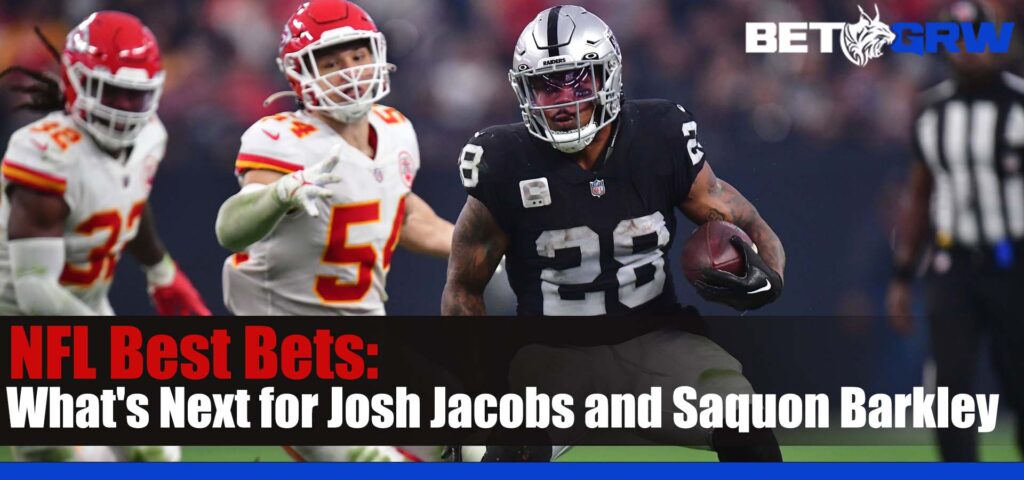
What’s Next for Josh Jacobs and Saquon Barkley? The recent franchise tag deadline came and went, leaving two prominent running backs, Saquon Barkley and Josh Jacobs, without the long-term contracts they hoped for. As the New York Giants and Las Vegas Raiders remain at a standstill in negotiations, questions arise about the future of these talented players. In this article, we delve deeper into the implications of their situations and explore the potential paths that lie ahead for Barkley and Jacobs. Stay tuned for more football team updates in Canada.
Training Camp Absences
As expected, Barkley and Jacobs will likely be absent when veteran players report to training camp on July 25. As unsigned franchise players, they cannot be fined for missing these activities, as they are not contractually obligated to attend without a signed agreement. This strategy is common among franchise players who want to voice their dissatisfaction with the lack of a long-term deal while minimizing the risk of injuries that could impact their market value.
What’s Next for Josh Jacobs and Saquon Barkley: Potential Regular Season Impact
There has been speculation about the possibility of Barkley and Josh Jacobs missing regular season games due to their contract situations. For each week missed, they would forfeit a portion of their $10.091 million franchise tender, resulting in a loss of $560,611 per week. Moreover, their teams would receive salary cap credits for the weeks they remain unsigned. However, it is worth noting that missing regular season games is rare for franchise players, with the last instance occurring in 2018 when Le’Veon Bell opted to sit out the entire season.
Rescinding Franchise Tenders
In extreme cases, the Giants and Raiders have the authority to rescind the franchise tenders of Saquon Barkley and Jacobs, thereby making them unrestricted free agents. This action would give each team an additional $10.091 million salary cap space. However, given Barkley and Jacobs’s significant contributions to their respective teams, it is implausible that the organizations would choose to take such a drastic step. Both players have proven themselves valuable assets, with Jacobs leading the NFL in rushing yards last season and Barkley as a focal point of the Giants’ offense.
Negotiating Conditions and Clauses
Although Barkley and Jacobs have not secured long-term deals, they can still negotiate various conditions and clauses on their franchise player status. While it is customary for franchise players to play under the tender amount, they may seek additional provisions in their contracts. For instance, they could insist on a prohibition clause preventing the team from using the franchise or transition designation in 2024. However, obtaining such clauses can be challenging for franchise players, as teams are often reluctant to concede these terms.
Considering the Running Back Market
Considering the current financial climate for running backs is crucial when evaluating Barkley and Jacobs’ future earnings. This year, teams have exercised fiscal restraint in free agency, resulting in fewer lucrative contracts for running backs. The highest-paying running back contract in the open market was a four-year, $25.64 million deal by Miles Sanders with the Carolina Panthers. Notably, the last running back to secure a substantial payday in free agency was Le’Veon Bell, who signed a four-year, $52.5 million contract with the New York Jets. However, Bell’s performance with the Jets fell short of expectations, highlighting the potential risks associated with large contracts for running backs.
Exploring Trade Options
Another potential action for Barkley and Jacobs is to push for a trade to a new team. However, it is essential to note that the restriction on signing long-term deals until the regular season ends also applies to the acquiring team in a trade. Therefore, an unsigned franchise player essentially possesses veto power over potential trades. While franchise player trades during the preseason are relatively rare, recent examples involving players like Jadeveon Clowney and Yannick Ngakoue demonstrate an unsigned player’s influence in determining their destination.
As Barkley and Jacobs navigate the uncertainty of their contract situations, their futures hang in the balance. The potential paths ahead include signing the franchise tag, negotiating additional conditions within their contracts, or exploring trade options. Ultimately, the financial landscape for running backs, the significance of these players to their respective teams, and their priorities will all play a crucial role in determining the outcome. The latest football news centers around the contract situations of Barkley and Jacobs, with their decisions carrying significant weight for their careers and the respective teams they play for.














